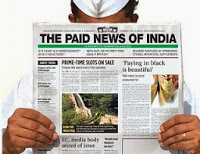Indian Media and the Allied Debates – Part I
Media is the fourth
pillar of Indian democracy. It is a source of information, awareness and also,
a mode creating sensational news. The visual and the apparent resources
entrusted with media inevitably make media a responsible entity. Therefore,
“ETHICS” to regulate media becomes very much important in a country like India
where multiple societal faiths exist. Nowadays, most of the part of a
newspapers front page is filled with advertisements; this clearly indicates
that the idea to make more and more money is on ascendant.Also, media has
continuously been publishing news which keeps it away from the informational
and educational pursuit.
pillar of Indian democracy. It is a source of information, awareness and also,
a mode creating sensational news. The visual and the apparent resources
entrusted with media inevitably make media a responsible entity. Therefore,
“ETHICS” to regulate media becomes very much important in a country like India
where multiple societal faiths exist. Nowadays, most of the part of a
newspapers front page is filled with advertisements; this clearly indicates
that the idea to make more and more money is on ascendant.Also, media has
continuously been publishing news which keeps it away from the informational
and educational pursuit.
Now the interrogation
which stands up is “Should Media be regulated?”. In the first overview, the
answer ascends an affirmation but when we inspect the norms of Indian
democracy, the idea is subject to negation. The Fundamental Rights enumerated
in the Indian Constitution here play a judgmental role. On one side, these
rights provide the ‘Freedom of Speech’ but on the other side, they restrict
this freedom. This makes the regulation a subject to debate.
which stands up is “Should Media be regulated?”. In the first overview, the
answer ascends an affirmation but when we inspect the norms of Indian
democracy, the idea is subject to negation. The Fundamental Rights enumerated
in the Indian Constitution here play a judgmental role. On one side, these
rights provide the ‘Freedom of Speech’ but on the other side, they restrict
this freedom. This makes the regulation a subject to debate.
The recent arrest of
two editors of a reputed news channel in relation to the “Paid News” on the
Coalgate scam has also become pejorative. The arrest of the two girls on their
updates on the death of a leader in India is again critical. The reporting
guidelines for Media are a directive again; the question is how much is that
justified. Moreover, media in India is not limited to the contemporary
designation; it extends to social media as well. The pros and cons taking in
account all the trends and types are to be discussed in furtherance of this
debate.
two editors of a reputed news channel in relation to the “Paid News” on the
Coalgate scam has also become pejorative. The arrest of the two girls on their
updates on the death of a leader in India is again critical. The reporting
guidelines for Media are a directive again; the question is how much is that
justified. Moreover, media in India is not limited to the contemporary
designation; it extends to social media as well. The pros and cons taking in
account all the trends and types are to be discussed in furtherance of this
debate.
This is a part of the series of Analysis of Indian Media & Journalism. Please keep checking for the next part.
Author:-
Tejaswini Ranjan
2nd year, CNLU,




![Police Reforms – Priority ignored [Republished from Epilogue Press] Police Reforms – Priority ignored [Republished from Epilogue Press]](https://arguendo.co.in/wp-content/uploads/2017/07/41-150x150.jpg)

Leave a Reply